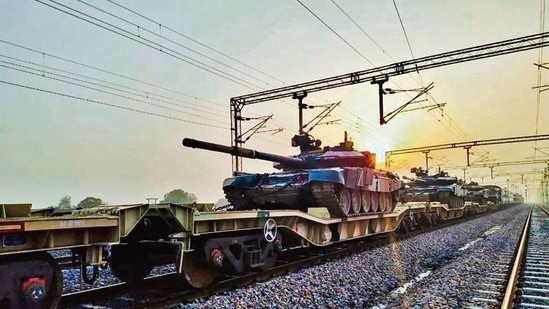Army eyes faster mobility via dedicated rail corridors
The drill saw a military train transport vehicles and equipment from New Rewari in Haryana to New Phulera in Rajasthan on Monday.
The Indian Army said in a statement that it carried out its first trial run to move military hardware, including tanks, by rail along a dedicated freight corridor (DFC) in the country’s north, an approach that could, if expanded and implemented, allow the armed forces to swiftly transport equipment to shore up operational readiness, .

The drill saw a military train transport vehicles and equipment from New Rewari in Haryana to New Phulera in Rajasthan on Monday.
Such dedicated corridors will allow the armed forces to increase the pace of deployment of military hardware to areas where they are needed for operational reasons as freight trains will be able to clock average speeds of 75 kmph instead of the current 35-40 kmph, people familiar with the development said on the condition of anonymity.
In some cases, freight travel time will be reduced by several days once the DFC ‘quadrilateral’ connecting Delhi, Mumbai, Chennai and Kolkata is ready, they added.
The army carried out the drill in coordination with the Dedicated Freight Corridor Corporation of India Ltd (DFCCIL) and Indian Railways.
“Interactions by the Indian Army with all stakeholders including DFCCIL and Indian Railways will now assist in leveraging the DFC and allied infrastructure into the mobilisation matrix of the armed forces,” the statement said. Development of infrastructure at certain locations to support mobilisation and trials to validate the movement of defence-owned rolling stock cargo (wheeled or tracked vehicles) is being formalised, the people cited above said.
“These trials were part of the ‘whole-of-the-nation approach’ for optimising national resources and achieving seamless synergy among various ministries and departments. This initiative would set in place processes to ensure that military requirements are dovetailed in the national infrastructure development at the planning stage itself,” the statement added.
Experts said faster movement of military hardware would help.
“In futuristic scenarios, there will be short-duration intense wars wherein speedy mobilisation will be an important element for build-up/switching of forces. It’s a very positive move,” said former Northern Army commander Lieutenant General BS Jaswal (retd).
Movement of military hardware on regular freight routes is a cumbersome and time-consuming process, said one of the officials cited above.
“Military movement on regular freight routes takes place at a snail’s pace…in some cases taking as many as seven to 10 days. With these successful trials, we are sure military equipment can be moved from Kolkata to Ludhiana in just 24 hours which, in rail terms, is rocket speed,” he said.
A dedicated corridor speeds up transportation time as it does not involve halts. “Earlier, these trains usually had to take halts every 150 km. A huge amount of time will be saved as the DFC routes will not require stoppages,” said a second official.
In May, freight trains on the DFC clocked a record average speed of 99.38 kmph, faster than the average speed of 80 kmph of the Rajdhani trains. Three trains ran at an average speed of more than 99 kmph, the fastest being on the 331-km New Khurja-New Bhaupur section of the Eastern Dedicated Freight Corridor (EDFC), which was opened for operations by Prime Minister Narendra Modi on December 29, 2020.
DFCCIL has been tasked with developing Indian Railways’ quadrilateral linking the four metropolitan cities of Delhi, Mumbai, Chennai and Kolkata, commonly known as the Golden Quadrilateral. The overall project cost is pegged at ₹81,459 crore.
In the first phase, the organisation is constructing the Western DFC (1,504 route km) and the EDFC (1,856 route km) spanning a total length of 3,360 route km. Route km refers to the distance between two points on the railway network, irrespective of the number of connecting lines.
These corridors are targeted to be completed in phases by December 2021.
EDFC will start from Sahnewal in Punjab and end at at Dankuni in West Bengal, passing through Haryana, Bihar, Uttar Pradesh and Jharkhand. WDFC, connecting Dadri in Uttar Pradesh to Jawaharlal Nehru Port in Mumbai will pass through Gujarat, Maharashtra, Rajasthan and Haryana.
...






